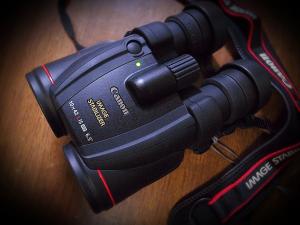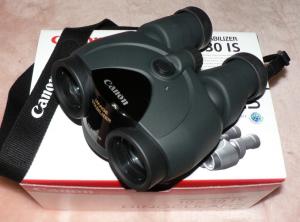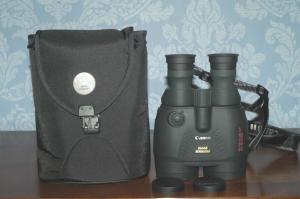Canon Image Stabilised Binoculars Review
Submitted: Monday, 24th June 2013 by Rita Jacobson
In this review I will cover the different models of Canon binoculars as well as the use of image stabilised binoculars for astronomy. I am an amateur astronomer with a great passion for binoculars. I have a few pairs that I use for astronomy as well as other outdoor activities. I own the Canon 10x42L and Canon 10x30 but will also cover the other models in this review. Why Use Binoculars for Astronomy?
What to Look for in Astronomy BinocularsThere is a-lot to say about choosing the right binoculars so I won’t bore you with too much detail. Basically, for night use, you want to have enough magnification (10x and above) as well as large objective lenses (30mm or 42mm and above). You also want good quality optics. Higher magnification, also referred to as “power”, means you can get closer to the stars and see them in more detail. This also means a narrower field of view and a less stable image - unless you choose image stabilised binoculars. Large lenses mean that more light comes in which results in a brighter image. This is extremely important to us astronomers! High quality of the glass, optics and coating also means brighter images and less distortion when using high magnification. This is the reason I strongly suggest that you DON’T purchase cheap binoculars for astronomy - you will simply get a dark blurry image at night and will be throwing your money away. Canon Image Stabilised BinocularsSo here’s the problem: when you are using a powerful set of binoculars you get a shaky image. The higher your magnification is, the less stable the image is. This simply results in un-usable binoculars. If you are always carrying a tripod along with you then fine, but if you are not or if you like to hold your binoculars from time to time or use the tripod for your telescope instead then you have a problem. Canon developed an incredible technology to solve this. Using their image stabilising feature, the image is electronically stabilised with a press of a button. This allows you to use their high quality, powerful, bright binoculars without the need for a tripod. Because the image is perfectly stabilised it also appears sharper and better. Which Model?There are six models of Canon image stabilised binoculars to choose from:
I own the Canon 10x42 and the Canon 10x30 so will cover these two first. Canon 10x42L IS Binoculars |
 |
Click to Enlarge Canon 10x42L IS Binoculars |
In my opinion these are the best ones and here’s why:
 |
Click to Enlarge Canon 10x30 Binoculars |
This is a more compact, lightweight version. Even with only 30mm lenses you can easily use these for looking at the stars. I like to go out with my son and he uses the 10x30. They are a joy to spot with.
The image stabilisation kind of makes up for the smaller lenses - so you get a much better image than low or mid priced binoculars. We also use the 10x30 when traveling and without a tripod of course.
 |
Click to Enlarge Canon 18x50 Binoculars and Canon 15x50 Binoculars |
These models have the highest magnifications and are extremely powerful. Like the 10x42, they produce a remarkable image. Because of the larger lenses, you will be able to achieve a superior brighter image. The downside with these models is that they are bulkier and heavier. If you’re looking at the sky for a long time then you will probably need to use a tripod with these. But if you don’t mind the size and weight - these are great for astronomy! I heard and read only good things about them.
Like most people, I would choose the 18x50 because you get more power and the price is almost the same.
This is only my personal opinion but I wouldn’t go with these ones simply because they cost almost twice as the 10x30 model. As far as features and quality go they seem to be very similar to the 10x30’s
This is a very compact model and mainly built for other uses. Although they have IS technology I doubt they will deliver a bright enough image for night viewing. They could be a good choice for birding, hunting or traveling though.
Most shops in Australia won’t even stock the Canon binoculars. I talked to a shop owner recently and he said that these are amazing binoculars but he won’t even bother selling them. Prices online are just so much cheaper.
I would expect to pay anywhere between $1,200 to $1,500 for the larger models and around $500 to $600 for the Canon 10x30 ones. Some shops might charge up to $2,500 for the Canon 18x50’s.
I bought both my Canon binoculars on Procular.com.au and was very happy with my purchases. They distribute in the US too and have the best prices for them. I also trust them because I ordered from them a few times before and know they are legit. They have great info on the site and deliver fast and free.
There is a reason so many people are raving about Canon and image stabilised binoculars. From my experience these are simply the best binoculars you can own. For astronomy as well as for any other use.
I can personally recommend the 10x42, 18x50 and the more compact 10x30 for when you’re star gazing on the road.
Review by Rita Jacobson (Ritajacobson). Discuss this review on the IceInSpace Forum.